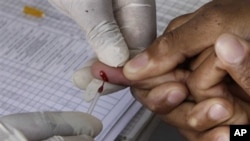As Kenya begins its first National AIDS Conference in Nairobi, hundreds of Kenyans living with HIV have gathered to demand that promises are kept in fighting the disease.
On Wednesday morning, Kenya’s Minister for Special Programs Esther Murugi opened the first, biennial Kenya National AIDS Conference. But as Murugi and other Kenyan officials kicked off the discussion, their presence was overshadowed by accusatory chants from hundreds of HIV-positive Kenyans in attendance.
The group arrived at the conference after marching down Nairobi’s Thika Road, shouting slogans such as “You made a promise! Now make it happen,” and “You talk, we die!” The Kenya representative for American organization Health GAP, Paul Davis, described the scene.
“Today 350 people with HIV and their supporters from all over the country came to the opening ceremonies of the National AIDS Conference to demand that leaders keep their funding promises to fully fund the fight against HIV/AIDS,” he said.
While Murugi became the target of many of the group's chants, the protest was aimed at U.S. President Barack Obama and Kenyan Finance Minister Uhuru Kenyatta for failing to live up to previous promises of funding.
During his campaign in 2007, President Obama signed a pledge promising to contribute $50 billion over 5 years to support AIDS treatment for one-third of the people in need worldwide. Current U.S. funding levels support around 4 million people, about 2 million short of Mr. Obama’s promise.
Davis said Kenyatta had failed to deliver on more modest promises.
“Deputy Prime Minister Kenyatta promised - in fact he signed a contract with the United States - to increase domestic funding for health by 10 percent annually for each of four years. In the first year Uhuru made a start but did not really meet the 10 percent. This year it does not appear that we are even coming close,” he said.
The march comes as Kenyatta puts the finishing touches on Kenya’s budget for 2011-2012, due in June. Local and international HIV / AIDS groups are calling on the finance minister to increase health funding by 20 percent from 2009 levels.
Kenya is facing one of the world’s most serious HIV epidemics. Around 1.5 million residents are currently living with the disease and as many as 80,000 die from the disease each year.
The protesters at the National AIDS Conference are calling for universal access to anti-retroviral drugs (ARVs). New studies have shown that anti-retroviral treatment for HIV patients can reduce infection rates by over 90 percent, nearly eliminating new infections.
Kenya's National Aids Control Council says it aims to cut the number of new HIV infections in half by 2013. Minister of Medical Services Anyang' Nyong'o said on Wednesday that in order to provide universal access to ARVs, Kenya would first have to raise the required funds. A number of plans are being presented at the National AIDS Conference and Nyong'o said he was hopeful that a workable plan could be found.
HIV Positive Kenyans Call on Leaders to Deliver on HIV Funding




